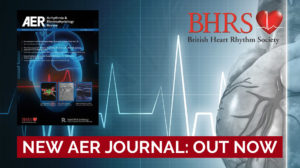AER Journal
International, open access, peer-reviewed journal
AER Journal
Arrhythmia and Electrophysiology Review (AER) is an international, open access, peer-reviewed journal that is indexed on PubMed, Scopus, the Emerging Sources Citation Index (ESCI) and the Directory of Open Access Journals (DOAJ). It comprises balanced and comprehensive review articles, editorials and expert opinion pieces written by leading authorities, addressing the most important and salient developments in arrhythmia and cardiac electrophysiology.
Led by Editor-in-Chief, Dr Demosthenes G Katritsis, along with a team of Section Editors and an editorial board of world-renowned physicians, the journal publishes peer-reviewed articles that aim to provide timely updates on the most pertinent issues in the field.
For information on submitting an article, please use the below button.




AER Journal Library
- Arrhythmogenic Mitral Valve Prolapse: Can We Risk Stratify and Prevent Sudden Cardiac Death?
- British Heart Rhythm Society Standards for Implantation and Follow-up of Cardiac Rhythm Management Devices in Adults: January 2024 Update
- Outcomes of Device-detected Atrial High-rate Episodes in Patients with No Prior History of Atrial Fibrillation: A Systematic Review and Meta-analysis
- A Review of Personalised Cardiac Computational Modelling Using Electroanatomical Mapping Data
- Optimum Risk Assessment for Stroke in Atrial Fibrillation: Should We Hold the Status Quo or Consider Magnitude Synergism and Left Atrial Appendage Anatomy?
- Value of Extended Arrhythmia Screening in Adult Congenital Heart Disease Patients
- Drug-induced AF: Arrhythmogenic Mechanisms and Management Strategies
- Remarkable Reviewers in 2023
- What Cannot be Missed: Important Publications on Electrophysiology in 2023
- Intracardiac Echocardiography-guided Left Atrial Appendage Occlusion
- Endocardial Pulsed Field Ablation and the Oesophagus: Are Atrio-oesophageal Fistulas Now History?
- Left Atrial Appendage Occlusion: British Cardiovascular Intervention Society and British Heart Rhythm Society Position Statement
- Management of Calcified Coronary Lesions
- Non-invasive Vagus Nerve Simulation in Postural Orthostatic Tachycardia Syndrome
- Very-high-power Short-duration Ablation versus Conventional Ablation for Pulmonary Vein Isolation in Atrial Fibrillation: Systematic Review and Meta-analysis
- The Emerging Role of Left Bundle Branch Area Pacing for Cardiac Resynchronisation Therapy
- Open Window Mapping of Accessory Pathways: A Literature Review and Practical Guide
- Chest Pain in Women: Gender- and Sex-based Differences in the Presentation and Diagnosis of Heart Disease
- Explaining the Unexplained: A Practical Approach to Investigating the Cardiac Arrest Survivor
- Septal and Conduction System Pacing


